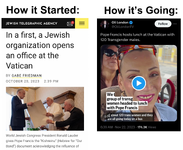In Matthew 26:52, Jesus made a statement that has become famous: “Put your sword in it’s place, for all who take the sword will perish by the sword.” The statement was made to Peter who had drawn his sword in order to defend Jesus from being captured and crucified. The saying of Jesus is often paraphrased as “he who lives by the sword dies by the sword.” What it means, of course, is that people who conquer through violence ultimately end up dying by violence. Or to put it more simply: what goes around comes around. Live a peaceful life towards others and they will generally be peaceful to you.
As with essentially all of Jesus’ teachings, stories from the Old Testament teach similar themes. In the case of “he who lives by the sword dies by the sword,” Genesis 31 gives us a vivid example of how this principle works through the story of Jacob and Laban. Prior to chapter 31, Jacob stole his brother’s birthright and then tricked his elderly father into blessing him rather than his elder brother. Jacob then left the promised land to obtain a wife from his uncle Laban’s family. Laban ultimately lied and tricked Jacob into serving him for many extra years to obtain the wife Laban originally promised him. Jacob, in turn, cheated Laban out of the strongest lambs from his flock after they had reached an agreement. Ultimately, Jacob flees Laban and Laban and his tribe pursue Jacob.
From this story we can see what Jesus later taught explicitly: “he who lives by the sword dies by the sword.” If our life consists of lying, cheating, stealing, gossiping, and fighting with others, then we can expect the same in return. If we wish to hold everyone accountable “an eye for an eye,” then we can expect the same from them. But God provides us with a different option. At the end of chapter 31, we see that although division and fighting and separation are part of our human existence, we can overcome these tendencies. At the end of chapter 31, Jacob and Laban reach a truce, an agreement to stop the cycle of violence.
And ultimately, stopping the cycle of violence and creating a new cycle of forgiveness and mercy is what Jesus offered us. Rather than fighting back against his captors, he tells Peter to put away the sword. Instead of cursing his persecutors he says, “Father, forgive them, for they do not know what they do” (Luke 23:34). Even if our life has been full of deception, division, and fighting with others, we have an opportunity to follow the example of Jacob and Laban in Genesis 31:43-55, and “put away the sword.” We have the ability, like Jesus, to begin a different cycle: one based on mercy, forgiveness, and reconciliation.

